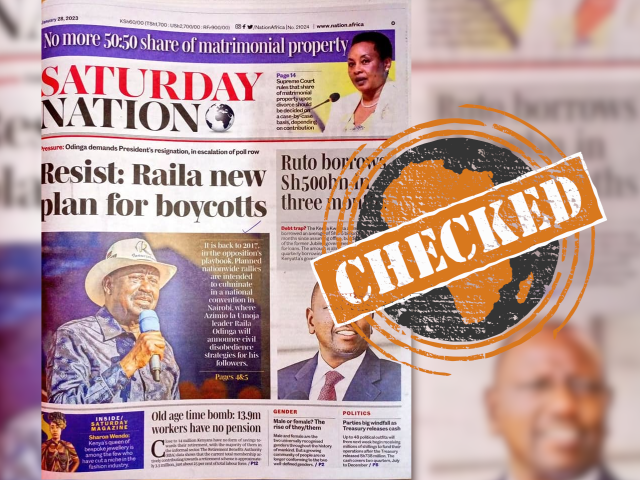This article is more than 7 years old
South Africa’s city of gold has a new mayor and a new mayoral committee.
The Democratic Alliance’s Herman Mashaba was elected as mayor of Johannesburg in August 2016. The mayoral committee he appointed has just as many women as men.
A Business LIVE report quoted Mashaba’s spokesman, Gabu Tugwana, as saying that this was unique in South Africa.
According to the report, Tugwana said that “Mashaba was the only mayor with 50% women and 50% men in his mayoral committee”.
Business LIVE journalist Penelope Mashego told Africa Check that she had misquoted Tugwana. He actually told her that Mashaba is one of the mayors in South Africa with an equal number of men and women in his mayoral committee. (Note: Business LIVE has since updated the report with the correct quote but did not indicate that it is a correction.)
Checking South Africa’s other metropolitan municipalities shows that Tugwana is correct that Johannesburg is not the only municipality where half of its mayoral committee members are female.
Women are in the minority in mayoral committees in Tshwane (30%), Cape Town (27%) and Nelson Mandela Bay (27%).
But Ekurhuleni on the East Rand also has an equal number of men and women in its mayoral committee. And women outnumber men in the mayoral committees of Mangaung (56%) and Buffalo City (60%).
(Note: Buffalo City’s website shows that there are five women and four men in the mayoral committee. However, personal assistant to Buffalo City’s mayor, Philasande Pula, told Africa Check that deputy executive mayor, Zoliswa Matana, also sits on the mayoral committee. This increases the number of women to six out of ten members.)
Business LIVE reported that Johannesburg’s mayor Herman Mashaba was the only mayor in South Africa with “50% women and 50% men in his mayoral committee”.
The claim was attributed to Mashaba’s spokesman, Gabu Tugwana, but the publication has since admitted that Tugwana was misquoted.
The reported claim is incorrect. Ekurhuleni on the East Rand also has an equal number of men and women in its mayoral committee. Women outnumber men in the mayoral committees of Mangaung and Buffalo City.
Additional reporting by Masutane Modjadji. Edited by Anim van Wyk.
The Democratic Alliance’s Herman Mashaba was elected as mayor of Johannesburg in August 2016. The mayoral committee he appointed has just as many women as men.
A Business LIVE report quoted Mashaba’s spokesman, Gabu Tugwana, as saying that this was unique in South Africa.
According to the report, Tugwana said that “Mashaba was the only mayor with 50% women and 50% men in his mayoral committee”.
Mashaba’s spokesman misquoted
Business LIVE journalist Penelope Mashego told Africa Check that she had misquoted Tugwana. He actually told her that Mashaba is one of the mayors in South Africa with an equal number of men and women in his mayoral committee. (Note: Business LIVE has since updated the report with the correct quote but did not indicate that it is a correction.)
Checking South Africa’s other metropolitan municipalities shows that Tugwana is correct that Johannesburg is not the only municipality where half of its mayoral committee members are female.
Women are in the minority in mayoral committees in Tshwane (30%), Cape Town (27%) and Nelson Mandela Bay (27%).
But Ekurhuleni on the East Rand also has an equal number of men and women in its mayoral committee. And women outnumber men in the mayoral committees of Mangaung (56%) and Buffalo City (60%).
(Note: Buffalo City’s website shows that there are five women and four men in the mayoral committee. However, personal assistant to Buffalo City’s mayor, Philasande Pula, told Africa Check that deputy executive mayor, Zoliswa Matana, also sits on the mayoral committee. This increases the number of women to six out of ten members.)
How are municipalities governed in SA?South Africa’s metropolitan municipalities - with the exception of the City of eThekwini (Durban) - are governed under a mayoral executive system. This is one of three government systems provided for in the Municipal Structures Act. (Note: The other systems are a collective executive system and plenary executive system.) Under a mayoral executive system, the municipal council elects an executive mayor who holds executive authority. The executive mayor in turn appoints a mayoral committee to assist him or her. The Municipal Structures Act states that “the mayoral committee must consist of the deputy executive mayor (if any) and as many councillors as may be necessary for effective and efficient government, provided that no more than 20% of the councillors or 10 councillors, whichever is the least, are appointed”. The South African Local Government Association’s media relations officer, Sivuyile Mbambato, told Africa Check that there are 257 municipalities in the country. Exactly how many municipalities are governed under the mayoral executive system is unclear. It has been estimated at around two thirds. Mbambato did not respond to questions seeking to clarify this. |
Conclusion: The reported claim is incorrect
Business LIVE reported that Johannesburg’s mayor Herman Mashaba was the only mayor in South Africa with “50% women and 50% men in his mayoral committee”.
The claim was attributed to Mashaba’s spokesman, Gabu Tugwana, but the publication has since admitted that Tugwana was misquoted.
The reported claim is incorrect. Ekurhuleni on the East Rand also has an equal number of men and women in its mayoral committee. Women outnumber men in the mayoral committees of Mangaung and Buffalo City.
Additional reporting by Masutane Modjadji. Edited by Anim van Wyk.



Add new comment